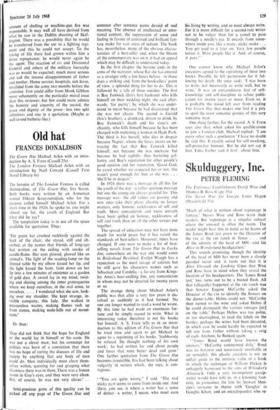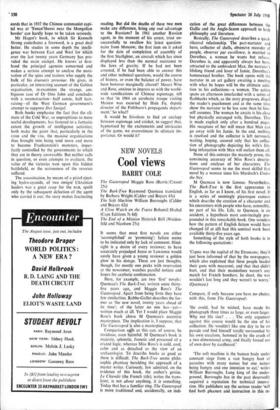Skulduggery, Inc.
PETER FLEMING
The Espionage Establishment David Wise and Thomas B. Ross (Cape 35s) The Secret War for Europe Louis Hagen (Macdonald 35s) 'Much of what is written about espionage is fantasy,' Messrs Wise and Ross warn their. readers. But 'espionage is a singular subject where the unusual is often the norm. The reader might bear this in mind as he learns of the James Bond test given to the Director of the CIA at the Hu ranch in Texas . . . and of the identity of the head of MI6—and his Alice in Wonderland headquarters.'
This sounds promising, though the identity of the head of MI6 has never been a closely guarded secret and it turns out that it is Alice Through the Looking Glass that Wise and Ross have in mind when they reveal the location of his headquarters. The 'James Bond test,' too, turns out to be a busted flush. All that (allegedly) happened at the LIM ranch was that Senator Eugene McCarthy asked the Director of the CIA to identify the flowers on the dinner-table; Helms could not. 'McCarthy then turned to the wine and asked Helms if he could distinguish the various vintages [sic) on the table.' Perhaps Helms was too polite, or too shortsighted, to read the labels on the bottles; perhaps the wines had been decanted, in which case he could hardly be expected to tell one from t'other without taking a swig of each. Anyhow, he flunked again.
'"James Bond would have known the answers," McCarthy commented drily.' Bond was no botanist and notoriously unreliable as an oenophil; this plastic anecdote is not an unfair guide to the intrinsic value of a book in which the technique of William Hickey is unhappily harnessed to the aims of Whitaker': Almanack. Only a very incompetent gossip- writer would have told us, in a knowing foot- note, to .pronounce the late Sir. Stewart Men- zies's surname to rhyme with 'Genghis' in Genghis Khan; and an encyclopaedist who re-
cords that in 1937 the Chinese communist capi- tal was at 'Yenan'Shensi near the Mongolian border' can hardly hope to be taken seriously.
Mr Hagen's book, to which Sir Kenneth Strong contributes a foreword, is a great deal better. He studies in some depth the intelli- gence war between East and West for which over the last twenty years Germany has pro- vided the main cockpit. He knows at first- hand the principal agencies concerned and makes a serious attempt to analyse the moti- vation of the spies and traitors who supply the bulk of his dramatis personae. He gives, in particular, an interesting account of the Gehlen organisation, re-examines the strange, am- biguous case of Dr Otto John and concludes with a reconstruction—half comic, half hair- raising—of the West German government's attempt to suppress Der Speigel.
Both books emphasise the fact that the cli- mate of the Cold War, so unpropitious to more useful developments, has fostered to a fantastic extent the growth of intelligence activities; both make the point that, particularly in the USSR and the USA, the massive organisations thus brought into being tend more and more to become Frankenstein's monsters, imper- fectly controlled by the governments to which they are in theory answerable. But neither calls in question, or even attempts to evaluate, the value of the victories won upon this hidden battlefield, or the seriousness of the reverses suffered.
The assassination, by means of a pistol eject- ing hydro-cyanide, of two emigre Ukrainian leaders was a great coup for the )(GB, spoilt only by the subsequent defection of the agent who carried it out; the story makes fascinating
reading. But did the deaths of these two men make any difference, bring any real advantage to the Russians? In 1961 another Russian agent, in the moment of his arrest, tried un- successfully to swallow his latest question- naire from Moscow; the first item on it asked for the date of completion of assembly of the first Starfighter, an aircraft which has since displayed less than the normal resistance to the laws of gravity. If he had not been arrested, if he had been able to answer this and other technical questions, would the course of history, or even the balance of power, have been however marginally altered? Messrs Wise, and Ross, anxious to impress us with the world- wide ramifications of Chinese espionage, tell us that 'in 1964 an acrobatic troupe visiting Mexico was escorted by Hsin Fu, deputy director of the Politburo's propaganda depart- ment.' So what?
It would be frivolous to find an analogy between espionage and cricket, to suggest that, hypnotised by the excitements and intricacies of the game, we overestimate its ultimate im- portance. Or would it?







































 Previous page
Previous page